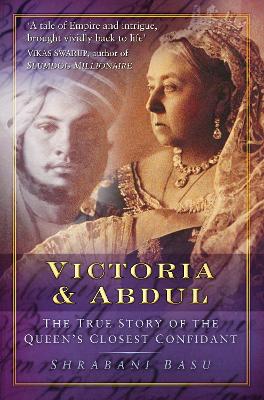Reviewed by Heather on
The central mystery in this story is Who Was Abdul Karim? Was he a selfless aide and friend to Queen Victoria or was he an enterprising, self-promoting, dangerous con man like the people around her believed? I think the answer is somewhere in the middle.
There is no question that he was a devoted servant of the Queen. He gave her Urdu lessons every day for years. He helped her answer her correspondence. He did influence her to be very concerned about Muslims in India. He also liked the trappings that came along with high status in the Royal Household. He insisted on not being treated as just one of the nameless servants. He would storm out of public events if he felt he was being slighted. He would get newspapers to write articles about him. He did suggest to the Queen that she give him and his family more and more honors.
This book did a wonderful job of getting into the mind of Queen Victoria through her writings. You understand where she was coming from. She loved Karim and his family. She was hurt by her family's and staff's hatred of him.
I don't think the book did as good of a job figuring out what was going on in Karim's mind. There are letters from him but he still felt like an enigma at the end of the book. He was in a hard position. There were several Indian servants but he was the only one in the closest inner circle to the Queen. The Royal Family and the household were both incredibly racist and classist. They hated him not only for being Indian but for not being an upper-class Indian. How dare he assume he was their equal?
Put in that situation I can't fault him for looking out for himself and his family. The Queen was elderly and he knew that he would be dealt with harshly after her death. He had to provide for his family while he could. Did he push too hard? Maybe. It doesn't excuse how he was treated though.
This is an infuriating read. The racism is so overt. Many letters from high British officials are included that just drip with disdain.
My only complaint about this book is that it is perhaps too detailed. There are so many letters cited that they started to all run together. But, I'd rather get too much information than not enough.
The narrator did a great job with all the voices required in this book - male, female, English, Indian, and Scottish.
There is a movie version of this book out now. I'm interested to see what angle they take on this story. Is it going to be a feel-good "Queen Victoria had a friend!" or is going to dive into the hatred from the people around her? I'll do a compare and contrast post after I get to see the movie.
This review was originally posted on Based On A True Story
Reading updates
- Started reading
- 20 September, 2017: Finished reading
- 20 September, 2017: Reviewed
